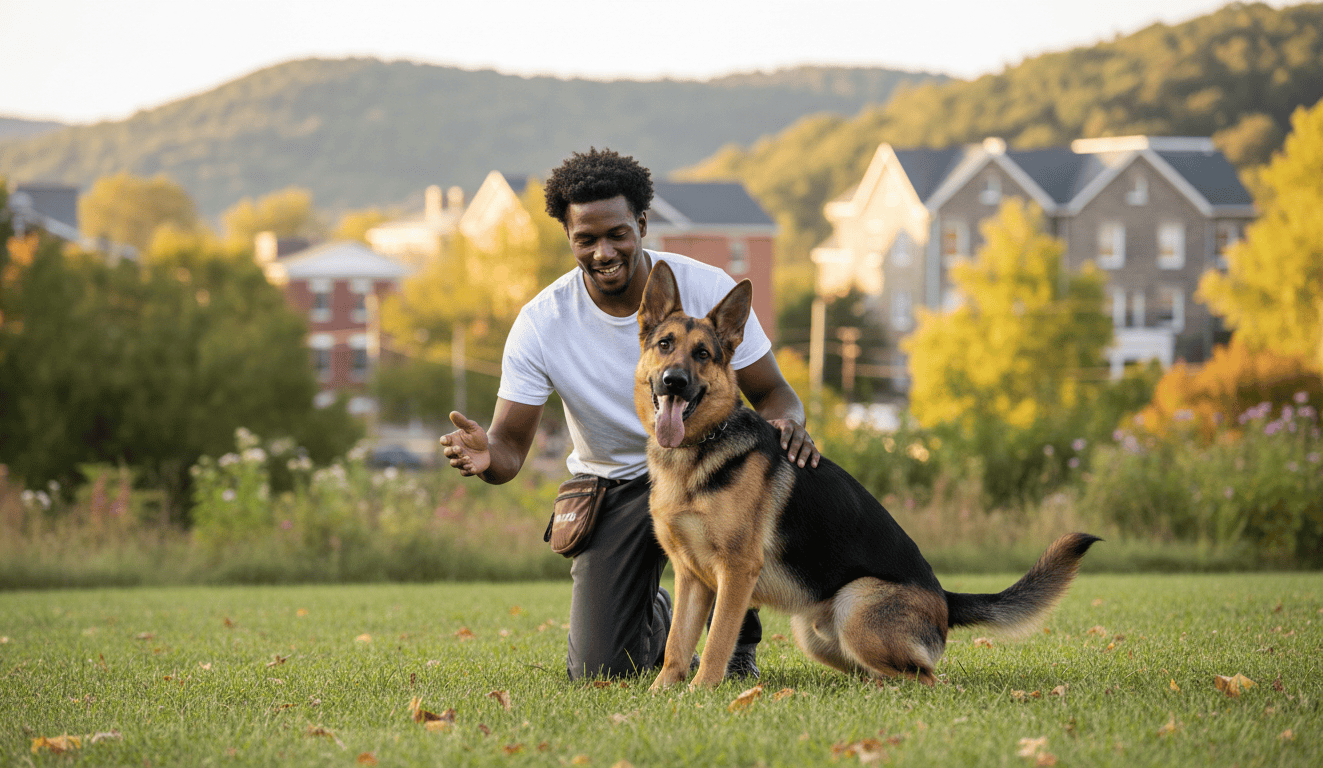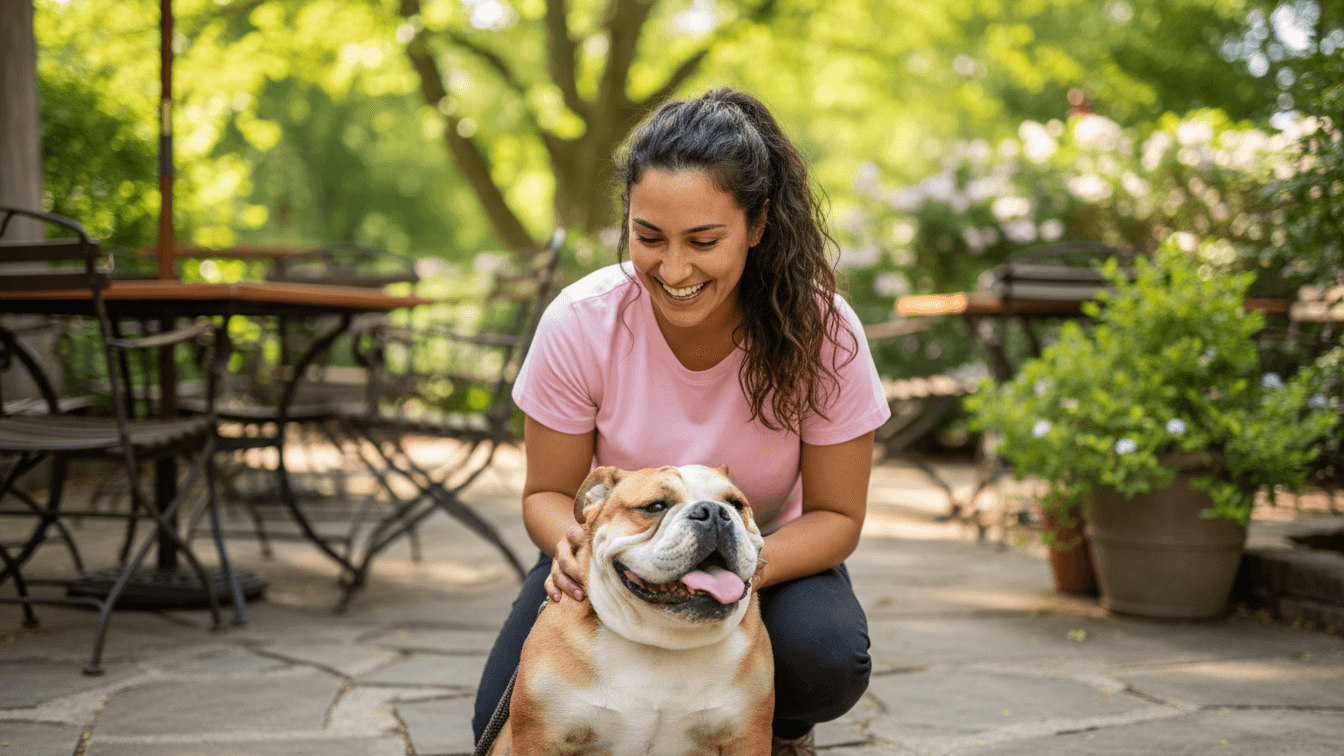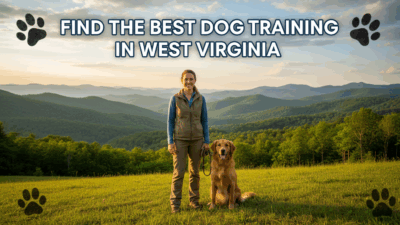Your Complete Guide to Choosing a Dog Trainer in West Virginia
Living with a dog in West Virginia means navigating mountain trails, small-town main streets, and communities where neighbors often know each other by name. Your dog needs to handle all of this calmly, from loose-leash walks through state parks to staying polite during visits to local shops that welcome well-behaved pets.
West Virginia doesn’t require dog trainers to hold state licenses, which means you’ll need to do your homework when choosing someone to work with your dog. When you find a professional dog trainer who uses humane methods and understands rural and small-town challenges, you’ll get better results both at home and out in your community.
How to Choose the Right Trainer
Start by looking for someone who uses positive reinforcement training and can set realistic goals for your West Virginia lifestyle. This means your dog should learn to walk calmly on busy greenways, stay focused near farm animals and wildlife, and handle trips to the vet without drama.
Credentials give you a quick way to compare trainers’ experience levels. Common dog trainer certifications include KPA-CTP, CPDT-KA, or IAABC-CDBC for behavior problems. If your dog has serious aggression issues, look for someone with CBCC-KA or a science-based program like CTC.
In-home dog training works great for puppy manners, door greetings, and neighborhood leash skills. Group classes make sense once your dog can focus around other dogs, especially before you try busy spots like farmers markets or downtown festivals.
Common Dog Training Methods Explained

Reward-based methods build the trust you want while creating lasting behavior changes. They also help you follow West Virginia’s local ordinances about keeping dogs under control in public spaces.
Basic obedience covers sit, down, stay, place, recall, and leash training so your dog can handle walks, outdoor events, and park visits without pulling or jumping on people. These skills matter even more when you’re navigating steep trails or crossing paths with wildlife.
Puppy training focuses on socialization, potty training, bite control, crate comfort, and early leash skills. Starting with short, positive sessions prevents bad habits from forming in the first place. Exposing puppies to different surfaces, sounds, and animals early on builds confidence for life in West Virginia’s varied terrain.
Behavior modification addresses fear, reactivity, resource guarding, or separation anxiety through careful desensitization and counterconditioning. For serious cases, ask if your trainer works with local veterinarians who understand behavioral medication when needed.
Private lessons and in-home sessions let you customize everything around your daily routines, while day training can speed up results when you’re short on time. Board and train programs offer intensive work over several weeks, but make sure any facility provides detailed handoff sessions so you can maintain what your dog learned.
Dog training classes help your dog practice good manners around other dogs and people. The best classes give dogs plenty of space, screen participants carefully, and teach calm behavior rather than just excitement.
Specialized training like therapy dog training or service dog training requires extra structure, public-access skills, and a very clear step-by-step program. These dogs need to handle everything from hospital visits to navigating crowded spaces without breaking focus.
Stay away from trainers who use fear, intimidation, or pain to get results. Humane methods are safer for everyone, easier to maintain long-term, and much better for building a trusting relationship with your dog.
Average Cost of Dog Training in West Virginia and Surrounding Areas (Updated for 2025)
Prices across West Virginia depend on the trainer’s experience, how long training sessions last, and where the training happens. Urban areas like Charleston and Morgantown tend to run slightly higher, while smaller towns may offer more affordable rates. Here’s what most pet owners are paying in 2025.
| Service Type | Average Cost (West Virginia) |
|---|---|
| Puppy classes (4-6 weeks) | $120-$225 total |
| Group obedience training classes (4-6 weeks) | $140-$275 total |
| Private lessons (60-90 min) | $90-$160 per session |
| In-home coaching packages (4-6 visits) | $380-$800 total |
| Day training (trainer works your dog + handoff) | $400-$850 per week |
| Behavior consult for reactivity/anxiety (initial) | $125-$225 |
| Board and train (2-4 weeks) | $1,800-$4,200 total |
You’ll probably pay extra travel fees if you live in more remote areas, and expect higher rates for complex behavior work like aggressive dog training or severe separation anxiety.
Make sure you understand what’s included, how the trainer tracks progress, and whether they offer a free consultation before you sign up. Many expert dog trainers in West Virginia will meet with you first to assess your dog and explain their training program.
Questions to Ask a Potential Dog Trainer
- What training methods do you use, and how do you keep sessions positive and low-stress?
- What credentials do you have, like KPA-CTP or CPDT-KA? Do you keep up with continuing education such as CPDT-KSA?
- How will you customize the training plan for my dog’s specific needs and our West Virginia lifestyle?
- Do you offer in-home visits, dog training classes, or day training, and which approach fits my goals best?
- How will we measure my dog’s progress and know when to add more distractions?
- What are the total costs, including any travel fees, and what’s your cancellation policy?
- Do you carry liability insurance, and can you show me proof?
- For behavior problems, will you work with my veterinarian if needed?
- What should I practice between our sessions to help my dog keep improving?
- Have you worked with dogs who need to handle wildlife, farm animals, or challenging terrain?
Local West Virginia Rules and Considerations
West Virginia counties and municipalities enforce their own leash laws and nuisance ordinances to keep parks and neighborhoods safe for everyone. State law also sets basic requirements for rabies vaccination and animal welfare.
Most cities and towns require leashes in all public spaces except inside designated dog parks. Keep a standard 6-foot leash with you for town sidewalks, trails, and community events. Some areas have stricter regulations, so check with your local animal control office.
West Virginia law requires current rabies vaccination for all dogs over four months old. Your veterinarian will provide a rabies certificate and tag that should stay on your dog’s collar. You can find detailed information through the West Virginia Department of Health and Human Resources.
Excessive barking can be considered a nuisance in many West Virginia communities, so work with your trainer on alert barking and separation anxiety before neighbors start complaining. Rural areas may have more tolerance, but it’s still worth addressing early.
West Virginia doesn’t require special licenses or certifications for dog trainers. If a trainer offers board and train dog training services or kennels dogs overnight, they may need to follow county or municipal business regulations, but there’s no statewide trainer licensing system.
Some counties require dog licenses or registrations. Check with your local county clerk or animal control office to learn what applies in your area. Licensing fees are usually minimal and help support local animal services.
Local West Virginia Resources for Dog Owners
These spots give you great places to practice polite manners, work on recalls, and provide safe enrichment for your dog. Always follow the posted rules and etiquette guidelines.
- Little Creek Park Dog Park in South Charleston offers fenced areas where your dog can practice off-leash recalls in a safe environment
- Krepps Park Dog Park in Barboursville provides separate spaces for large and small dogs, perfect for socialization practice during quieter hours
- Coopers Rock State Forest near Morgantown welcomes leashed dogs on most trails, giving you excellent opportunities to build focus around wildlife and other hikers

FAQs
How much does in-home dog training cost?
Most West Virginia trainers charge $90-$160 per in-home visit, with discounts available when you buy packages. Behavior problems typically start at the higher end of that range, especially for reactivity or aggression work.
Is in-home dog training worth it?
Absolutely, because you’re working on problems exactly where they happen. Your trainer can fix door manners, jumping on guests, counter-surfing, and yard reactivity right at home, then step outside to practice leash skills on your actual neighborhood sidewalks or country roads.
Can you pay someone to house train your dog?
Yes, many trainers offer puppy training programs that include potty training, crate routines, and daily schedules. Day training can speed up the process while teaching you how to maintain the progress after the trainer leaves.
What is the 3-3-3 rule for dog training?
This is a helpful timeline for new or adopted dogs: expect about 3 days for your dog to decompress, 3 weeks to learn your routines, and 3 months to feel completely settled. Good dog training services work with this natural adjustment period instead of rushing the process.
How long will it take to reach my training goals?
Most puppies and friendly adult dogs show solid progress within 4-8 weeks if you practice daily. Fear, reactivity, or aggression typically requires several months of careful behavior modification with gradual increases in difficulty. Working around West Virginia’s wildlife and varied terrain may add time if your dog is especially distracted outdoors.
What should I bring to group classes?
Pack a flat collar or harness, a 6-foot leash, high-value treats, water, and current vaccination records if your trainer requests them. Leave retractable leashes at home for safety reasons, and bring patience for your dog’s first few sessions.
What’s the leash law in West Virginia?
Leash laws vary by city and county across West Virginia. Most municipalities require dogs to be leashed and under control in all public areas, except inside designated off-leash dog parks. Contact your local animal control office or check your city’s ordinances for specific rules in your area.
Do I need a dog license in West Virginia?
Some West Virginia counties and cities require dog licenses, while others don’t. Contact your local county clerk or animal control office to find out what applies where you live. Even if your area doesn’t require a license, you must keep your dog’s rabies vaccination current.
What shots does my dog need in West Virginia?
West Virginia law requires rabies vaccination for all dogs over four months old. Your veterinarian may also recommend distemper-parvo, bordetella, leptospirosis, and Lyme disease vaccines based on your dog’s lifestyle and exposure to wildlife or other animals.
Are dog trainers required to be licensed in West Virginia?
No special trainer licenses exist in West Virginia. Trainers follow normal business regulations, and certified dog trainer credentials are voluntary. Look for nationally recognized certifications to verify a trainer’s education and commitment to continuing education.
Where can I practice off-leash recall?
Use fenced dog parks like Little Creek Park Dog Park in South Charleston or Krepps Park Dog Park in Barboursville to keep things safe and legal. Try visiting during quieter hours when you’re starting out, so your dog has fewer distractions.
Which dog parks allow training around West Virginia?
Most public dog parks in West Virginia allow training as long as you’re not disrupting other visitors. Little Creek Park Dog Park and Krepps Park Dog Park both work well for practicing recalls and socialization. Always check posted rules before starting a training session.
What trails allow dogs for training?
Coopers Rock State Forest, Blackwater Falls State Park, and many sections of the Monongahela National Forest welcome leashed dogs on trails. These locations are perfect for teaching calm focus around wildlife, other hikers, and challenging terrain. Always keep your dog leashed unless you’re in a designated off-leash area.
How do I find a certified dog trainer in West Virginia?
Look for trainers who hold credentials from respected organizations and use positive reinforcement methods. Ask for proof of certifications, read reviews from other West Virginia dog owners, and request a free evaluation to see if the trainer’s style fits your needs.
What if my dog is reactive to wildlife?
Work with a trainer experienced in behavior modification who can help your dog learn calm responses to deer, squirrels, and other animals common in West Virginia. Start training in controlled environments before gradually adding real-world distractions on trails and in rural areas.
Can a trainer help my dog with separation anxiety?
Yes, many professional dog trainers specialize in separation anxiety through desensitization and counterconditioning. This work takes time and consistency, but it can dramatically improve your dog’s comfort when left alone. Ask potential trainers about their experience with this specific issue before starting a training program.
The right combination of thoughtful planning, humane methods, and consistent practice around West Virginia’s parks, trails, and neighborhoods will help your dog become a confident, well-behaved companion. If credentials matter to you, don’t hesitate to ask about dog trainer certifications and how your trainer stays current with new techniques. Whether you live in Charleston, Morgantown, Huntington, or a smaller mountain town, the best dog training starts with finding someone who understands both your dog’s needs and your local lifestyle.
